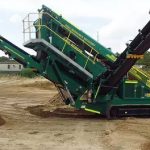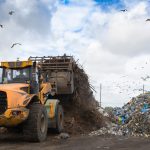Crushing and screening are critical processes in the recycling and construction industries. They transform bulky and unusable materials into valuable resources that can be reused in construction, roadworks, and other industrial applications. At Peel Resource Recovery, crushing and screening play a vital role in supporting sustainable resource management, ensuring that waste is minimized while valuable materials are recovered for future use.
In an era where sustainability and environmental responsibility are essential, the importance of these processes has never been greater. By breaking down construction and demolition waste into smaller, manageable pieces, crushing and screening help reduce the burden on landfills, conserve natural resources, and lower overall project costs.

crushing and screening services western australia ini mining field
What is Crushing and Screening?
Crushing and screening are complementary processes used to reduce the size of materials and separate them according to specific specifications.
- Crushing: This process involves breaking down large materials, such as concrete, rock, asphalt, or stone, into smaller fragments. Different crushers, such as jaw crushers, impact crushers, and cone crushers, are used depending on the hardness and size of the material.
- Screening: Once materials are crushed, they pass through screening equipment to be sorted into various sizes. This ensures that the final products meet the required standards for use in construction or other applications.
Together, these processes create a streamlined system that turns construction waste into usable products like aggregates, gravel, and sand.
The Importance of Crushing and Screening in Recycling
The modern construction industry generates enormous amounts of waste. Without proper management, this waste often ends up in landfills, contributing to environmental degradation. Crushing and screening provide a solution by turning what was once considered “waste” into useful resources.
1. Reducing Landfill Waste
Every year, millions of tons of construction and demolition waste are disposed of. Through crushing and screening, materials such as concrete and asphalt can be recycled and repurposed. This reduces landfill demand and extends their lifespan.
2. Conserving Natural Resources
Natural resources like sand, gravel, and stone are finite. By recycling and reusing crushed materials, industries reduce the need for fresh quarrying, preserving landscapes and reducing ecological impacts.
3. Lowering Project Costs
Using recycled aggregates can significantly reduce the cost of construction projects. Transport costs are minimized when recycled materials are processed locally, and purchasing new raw materials becomes less necessary.
4. Meeting Environmental Regulations
Governments around the world are setting strict regulations to reduce construction waste. Efficient crushing and screening help companies comply with environmental standards, ensuring sustainability while avoiding fines or penalties. For reference, the U.S. Environmental Protection Agency (EPA) highlights the importance of recycling construction and demolition materials.
Applications of Crushing and Screening
The versatility of crushing and screening makes it an essential process in a wide range of industries.
- Construction Projects: Recycled aggregates are commonly used in road bases, drainage materials, and concrete production.
- Demolition Sites: Old buildings and infrastructure can be dismantled, crushed, and screened to create new usable materials.
- Mining and Quarrying: Crushing and screening are used to separate valuable minerals from waste material.
- Infrastructure Development: Roads, highways, and bridges rely heavily on high-quality aggregates, many of which can be produced through recycling.
By providing reliable and sustainable aggregates, companies like Peel Resource Recovery contribute to the success of projects across multiple industries.
Crushing and Screening Equipment
Several types of machinery are used in crushing and screening processes, each designed for specific tasks:
- Jaw Crushers: Ideal for primary crushing of hard and abrasive materials.
- Impact Crushers: Perfect for softer materials and producing well-shaped aggregates.
- Cone Crushers: Suitable for secondary or tertiary crushing where finer materials are needed.
- Screeners: Used to classify crushed materials into different sizes for various applications.
Advancements in technology have made modern equipment more energy-efficient, reducing fuel consumption and minimizing emissions.
The Role of Crushing and Screening in Sustainability
Sustainability is no longer just a choice—it is a necessity. Crushing and screening align with circular economy principles by ensuring materials are reused rather than discarded.
- Circular Economy Contribution: Waste is transformed into resources, creating a continuous loop of material usage.
- Carbon Footprint Reduction: Recycling reduces emissions associated with quarrying, transportation, and material production.
- Community Benefits: Local processing reduces truck movements, lowering noise, dust, and congestion in nearby areas.
Peel Resource Recovery champions these principles by integrating efficient crushing and screening into their operations, providing communities and industries with reliable, eco-friendly solutions.
Challenges in Crushing and Screening
While the benefits are clear, challenges remain in optimizing the processes:
- Material Contamination: Waste streams may include mixed materials, requiring careful sorting.
- Operational Costs: Equipment maintenance and energy costs can be significant.
- Regulatory Compliance: Meeting environmental and safety standards requires strict adherence to guidelines.
Despite these challenges, companies investing in high-quality equipment and expertise, such as Peel Resource Recovery, continue to deliver superior results.
Future of Crushing and Screening
The future of crushing and screening is driven by innovation, sustainability, and digital technologies.
- Automation and AI: Advanced systems can optimize operations, monitor equipment, and reduce downtime.
- Green Energy Integration: Machines powered by renewable energy sources will further lower environmental impacts.
- Improved Recycling Rates: With growing awareness of sustainability, recycling through crushing and screening will only expand.
Peel Resource Recovery is positioned at the forefront of these advancements, ensuring their services evolve with industry demands and environmental expectations.
Conclusion
Crushing and screening are more than just industrial processes—they are essential components of sustainable construction and resource management. By reducing landfill waste, conserving natural resources, and supporting a circular economy, these processes contribute significantly to environmental protection and cost efficiency.
At Peel Resource Recovery, advanced crushing and screening solutions ensure industries across construction, mining, and demolition can access high-quality recycled materials while upholding the highest standards of sustainability. As industries continue to prioritize eco-friendly practices, crushing and screening will remain at the heart of responsible resource recovery.







